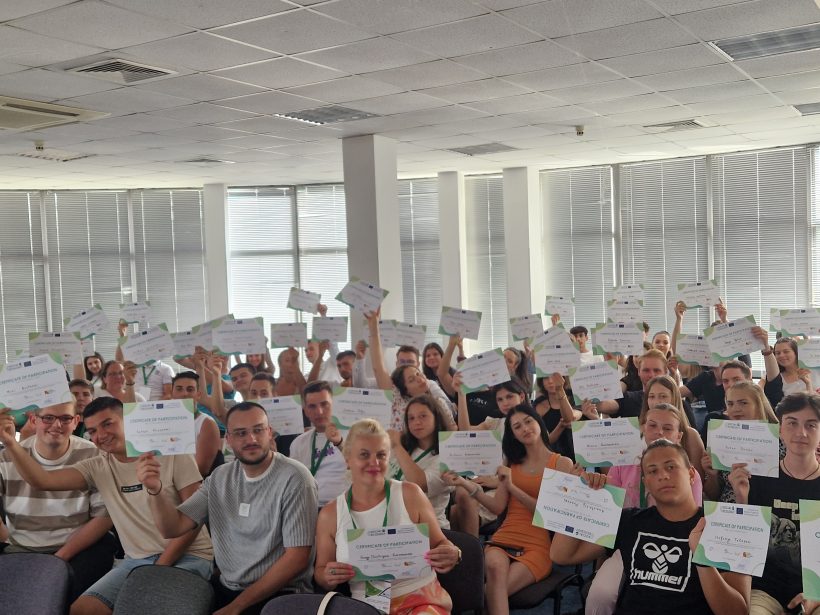On the fourth, fifth, and sixth days of the youth training event within the project “Social ecology – a model for sustainable European development in the 21st century”, 2020-2-BG01-KA205-079309), co-funded by the ‘Erasmus+’ Programme of the European Union, Key Action 2, the participants engaged in inspiring lectures and interactive group activities. The project is implemented by the Bulgarian Memory Foundation in partnership with the Association for Macedonian-Bulgarian Friendship, Bitola, North Macedonia, and Ecocenter Alapitvany, Budapest, Hungary.
The 60 young participants from the three countries actively participated in all program sessions, expressing their opinions and ideas, engaging in open communication both among themselves and with the guest lecturers.
Meglena Antonova, Campaign Manager of Greenpeace Bulgaria, addressed the question: “How does Greenpeace create change?” Explaining the organization’s goal to create a green and peaceful world where life can thrive, she delivered an inspiring presentation and initiated a discussion with the young people, including a series of environmentally-themed video clips.
Boriana Kamenova, Director of the Climate Change Policy Directorate at the Ministry of Environment and Water of the Republic of Bulgaria, presented the topic “Green Transformation – Transition to Sustainability.” According to her, green transformation is an opportunity for ensuring positive development for Bulgaria and the European Union, an opportunity that should not be missed. She emphasized that it is entirely possible but requires a fundamental change in thinking and behavior, a complete reorientation of national economies, changes in the functioning of institutions, businesses, local communities, and civil society to be effectively implemented.
Yasen Georgiev, Executive Director of the Institute for Economic Policy, provided practical advice to the young participants on obtaining funding for their green business ideas or initiatives. In an accessible and interesting manner, he presented the connection between economic logic and entrepreneurship, on the one hand, and environmental care, on the other.
The program also included various group work modules, creating a comfortable and motivating team environment. Participants actively exchanged opinions, questions, and ideas, researched and analyzed information online, and later presented on flip charts and PowerPoint the results of their work to group leaders and peers. All these activities contributed to their development and sense of belonging to a small learning community, fostering new friendships among them. Different methods of non-formal education, role-playing games, enactment of real scenarios, and diverse communication methods were successfully applied. The social-ecological methodology developed within the project was tested and implemented, contributing to its popularization and enhancement.
On the final, seventh day of the seminar, participants received certificates from the Bulgarian Memory Foundation for their participation in the project, serving as references for their subsequent educational and professional development.
*This publication reflects the views only of the author, and the Commission cannot be held responsible for any use, which may be made of the information contained therein.

